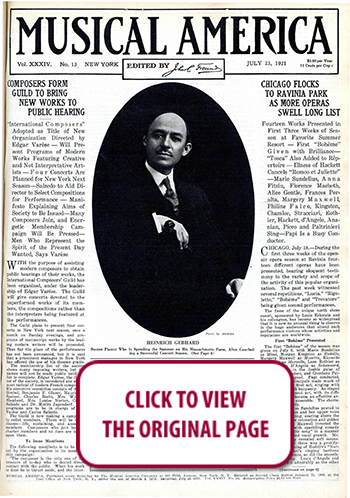 100 YEARS AGO IN MUSICAL AMERICA (403)
100 YEARS AGO IN MUSICAL AMERICA (403)
July 23, 1921
Page 1
COMPOSERS FORM GUILD TO BRING NEW WORKSTO PUBLIC HEARING
“International Composers” Adopted as Title of New Organization Directed by Edgar Varèse—Will Present Programs of Modern Works Featuring Creative and Not Interpretative Artists—Four Concerts Are Planned for New York Next Season—Salzedo to Aid Director to Select Compositions for Performance—Manifesto Explaining Aims of Society to Be Issued—Many Composers Join, and Energetic Membership Campaign Will Be Pressed—Men Who Represent the Spirit of the Present Day Wanted, Says Varèse
WITH the purpose of assisting modern composers to obtain public hearings of their works, the International Composers' Guild has been organized, under the leadership of Edgar Varèse. The Guild will give concerts devoted to the unperformed works of its members, the compositions rather than the interpreters being featured at the performances.
The Guild plans to present four concerts in New York next season, once a month on Sunday evenings, and programs of manuscript works by the leading modern writers will be presented. Thus far the place of the performances has not been announced, but it is said that a prominent manager in New York has offered the use of his theater gratis.
The membership list of the society shows many imposing writers, but the names will not be made public until the list is complete. Edgar Varèse, the director of the society, is considered one of the most radical of modern French composers. His executive committee consists of Adam Gimbel, Benjamin F. Glazer, Maurice J. Speiser, Charles Recht, Mrs. William Shepherd, Mrs. Louise Norton, Carlos Salzedo and Dr. Moritz Jagendorf. The programs are to be in charge of Mr. Varèse and Carlos Salzedo.
The Guild is now making a campaign to enlist members. There will be three classes—life, sustaining, and associate members. Composers who join become charter members and no dues are levied upon them.
To Issue Manifesto
The following manifesto is to be sent out by the organization in its membership campaign:
“The composer is the only one of the creators of to-day who is denied direct contact with the public. When his work is done he is thrust aside, and the interpreter enters, not to try to understand the composition but impertinently to judge it. Not finding in it any trace of the conventions to which he is accustomed, he banishes it from his programs, denouncing it as incoherent and unintelligible.
“In every other field the creator comes into some form of direct contact with his public. The poet and novelist enjoy the medium of the printed page; the painter and sculptor, the open doors of a gallery; the dramatist, the free scope of a stage. The composer must depend upon an · intermediary, the interpreter. “It is true that in response to public demand, our official organizations occasionally place on their programs a new work surrounded by established names. But such a work is carefully chosen from the most timid and anemic of contemporary productions, leaving absolutely unheard the composers who represent the true spirit of our time.
“Dying is the privilege of the weary. The present day composers refuse to die. They have realized the necessity of banding together and fighting for the right of each individual to secure a fair and free presentation of his work. It is out of such a collective will that the International Composers' Gui1d was born.
“The aim of the International Composers' Guild is to centralize the works of the day, to group them in programs intelligently and organically constructed, and, with the disinterested help of singers and instrumentalists, to present these works in such a way as to reveal their fundamental spirit.
“The International Composers' Guild refuses to admit any imitation, either of volition or of action.
“The International Composers' Guild disapproves of all 'isms;' denies the existence of schools; recognizes only the individual.
“If you are interested in the International Composers' Guild, let us hear from you.”
Director Tells of Plans
In a statement made to MUSICAL AMERICA concerning the plans of the Guild, Mr. Varèse said:
“Of all classes, it is- the composer who gets the least recognition. The conductors, most of whom are like prima donnas, thinking only of themselves, will not give unknown men a hearing; while the managers, believing the public does not enjoy the new works, will not produce them. I believe the public is extremely tolerant, however, and if the works of the newer writers are properly presented, will appreciate them.
“Our plan is to present the composer, not the interpreter. We will give lesser known interpreters a chance to appear, and they, with the composers themselves, will present the works. We shall give piano works, chamber music, other instrumental numbers, and perhaps get together a small orchestra. Already I have a large number of the leading writers on my membership list, and have some impressive manuscripts to present.
“What we want is to have a society whose membership will represent the composers of to-day—men who in their writing represent the spirit of the time.”




 RENT A PHOTO
RENT A PHOTO





